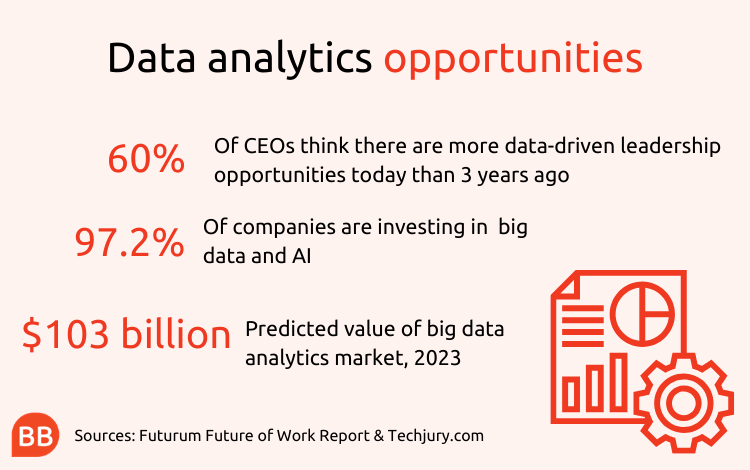When it comes to making smart, informed decisions, big data analytics can help. By gathering and analyzing large data sets, organizations can improve customer retention, manage risk, make operations more efficient, and much more.
In fact, according to a study by Futurum Research, more than half of CEOs believe there are more opportunities for data-driven leadership today than there were just a few years ago.
To make the most of these opportunities, organizations will need leaders who can navigate large quantities of data and use it to make informed decisions. To prepare future managers for this business landscape, many business schools are incorporating data analytics into their programs.
At Johns Hopkins Carey Business School (JHU Carey), incoming full-time MBA students can choose a new Analytics, Leadership, and Innovation pathway.
“This pathway emphasizes analytic skills, which are in high demand these days,” explains Goker Aydin, professor of operations management and business analytics at JHU Carey, who has been involved in creating the new pathway.
BusinessBecause caught up with Goker to find out how the big data skills being taught on the program can make you a better leader:
1. Data helps you backup your decisions with evidence
Now that companies have access to unprecedented quantities of data, the nature of decision making is changing. By understanding how to analyze and interpret this data, you can improve your leadership by making better informed decisions, Goker explains.
Being able to manipulate swaths of data without getting overwhelmed allows managers to pick out insights that might otherwise be missed.
On the Analytics, Leadership, and Innovation pathway at JHU Carey, students have ample opportunities to practice this kind of decision making, through experiential learning courses like the Big Data Consulting Project.
“The course will feature a partner organization ‘client’ providing a large data set with business enquiries,” Goker says. “Students will take the questions and come up with a creative solution.
"We expect students will adopt a mix of descriptive, predictive, and prescriptive analytics tools, as well as causal inference techniques, to create their solution."
Once these solutions have been created, teams must communicate them to the “client” in a presentation.
This experiential course helps prepare students for the kinds of jobs they’re likely to find when they graduate. “The presentation needs to be a clear, engaging, and convincing description, like a consultant would give,” Goker explains.
Consulting is a well-trodden career path for JHU Carey MBAs, about 26 percent of whom take up a consulting role when they graduate.

2. Understanding data helps you act as a bridge between teams
The ability to communicate technical insights to your team is another vital leadership skill that comes with an understanding of data analytics.
“There’s a demand for deep, thorough data science, but also a separate need to connect that expertise with organizational leaders,” says Goker.
This demand was suggested by a McKinsey report as far back as 2011. The report predicted a shortage of analytical skills by 2018, and noted that managers who can work with analytics would be highly in-demand.
“When MBAs become managers and rise in their organizations, I think they need to communicate with those who are in the ‘trenches’ of data analytics,” says Goker.
The latest Financial Times Skills Gap survey supports this view. The 2018 study found that big data analytics was one of the most difficult skills to recruit.
“I think there are more jobs than there are people to fill these kinds of positions right now,” Goker adds.
3. Data analytics will help you build convincing narratives
Knowing how to manipulate large quantities of data not only helps you make recommendations, it can also help you tell a convincing story that will help your team understand and use these insights.
By using data-visualization tools like Tableau, Goker says, managers can more concisely and convincingly get their points across.
On the Analytics, Leadership, and Innovation pathway at JHU Carey, students will learn to use tools like Tableau to build their own narratives, he says.
In a “boot camp” course at the start of the program, and in later courses on Statistics and Econometrics, he explains, they will be given a solid grip on data analysis, using R for statistical analysis, whether they have a strong quantitative background or not.
“For students who are not so quant-oriented coming in, I think the pathway will be an opportunity to keep learning, to build a subset of skills they can continue to add to after graduation,” he says.
“In these formats, you can slice and dice the data as you wish, build insights out of it, and create convincing narratives.”
Understanding what’s possible with data analytics, and what developments are coming, will also help leaders plan for the future of their organizations, he adds.
This future-focused mindset is something encouraged in JHU Carey’s MBA program. “What we do is give students a flavor of what is possible with data analytics, and what is on the horizon,” Goker notes.
Learn more about programs at the Johns Hopkins Carey Business School







